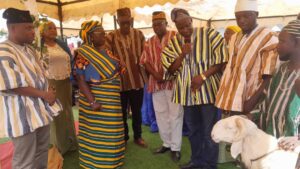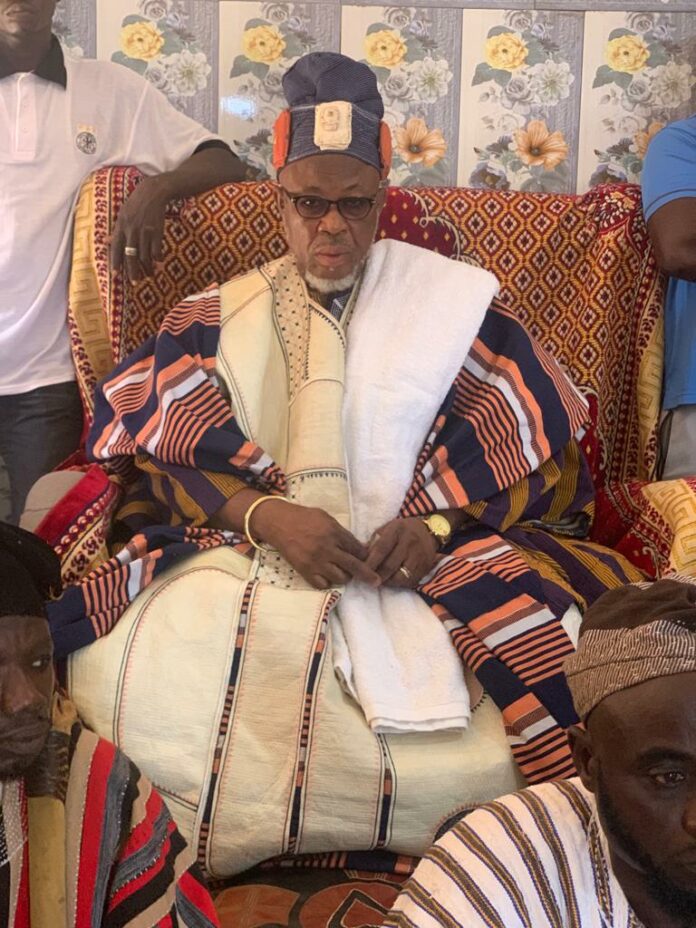The Nyankpala-Lana, Ibrahim Mahamadu, says his traditional area is bent on setting the pace in land management and administration in Dagbon.
According to him, his Land Management Committee was ready to give quick services to all land users in the Nyankpala Traditional Area and that prospective land users who will acquire land in the area will get good land titles for every piece of land they acquire.
“With Nyankpala Customary Land Secretariat in place, there shall no longer be any haphazard development in Nyankpala Traditional Area. The area will be well planned by the Physical Planning Officers of the Tolon District Assembly and Tamale Metropolitan Assembly.”
Nyankpala-Lana Mahamadu said this at the inauguration of the Nyankpala Customary Lands Secretariat office in Nyankpala. He said Nyankpala had prime land for residential, commercial and industrial purposes, and that his area had taken steps to bring rapid development to Nyankpala township, and the traditional area at large, adding, “Today is a special day for me, my elders, villages chiefs and the people of Nyankpala”.
The Nyankpala-Lana Mahamadu noted that it was his knowledge of the facts about his Enskingment as Chief of Nyankpala by the King of Dagbon, Ndan Ya-Na Abukari Mahama II, that he felt that his area with its prime land should be properly planned for rapid development.
He said Nyankpala has been in limelight since the colonial days and the area came into limelight since the early 1950s when the British Colonial Administration established an Agricultural College at Nyankpala to train the people of the Northern Territories in Modern Agriculture.
“The Agricultural College has metamorphosed into Savannah Agricultural Research Institute (SARI) which gave birth to the Nyankpala Campus of the University for Development Studies (UDS).”
He assure the Administrator of the Customary Stool Land Secretariat that she will hear of them in dispatches that their customary lands secretariat will excel in the management of and its handling of finances of the Secretariat and any assignment the Regional Office may give.
“I extend a Special Welcome to the Administrator of Stool Lands and the Assistant Controller of Stool Lands who in spite of their heavy schedules came to inaugurate the Nyankpala Customary Land Secretariat.”
 Mrs. Maame Ama Edumadze Acquah, the Administrator of Stool Lands said it was disheartening that our land management practices were fraught with many worrying practices even in this century. She said issues of indeterminate boundaries, conflicts, multiple sales, improper record keeping and documentation were still with us.
Mrs. Maame Ama Edumadze Acquah, the Administrator of Stool Lands said it was disheartening that our land management practices were fraught with many worrying practices even in this century. She said issues of indeterminate boundaries, conflicts, multiple sales, improper record keeping and documentation were still with us.
Mrs. Acquaah said the Office of the Administrator of Stool Lands (OASL) is mandated by Article 267 (2) of the 1992 Constitution and the OASL Act of 1994, Act of the Act 481 to collect all rent, dues, tributes, royalties and other revenue whether in the nature of income or capital from stool/skin lands and disburse same according to prescribed formula for the benefit of stool/skins, traditional authorities and district assemblies.
“It must be emphasised that the passage of the Land Act 2020 (Act 1036) into law has now grounded the establishment and operations of the Customary Lands Secretariats (CLS) in law. Per section 14 (1) of the Land Act 2020, Act 1036, A stool, skin, clan or family that owns lands shall in accordance with the Act, establish a customary land secretariat as prescribed by regulations made under the Act for the management of its land.”
She said the provision has made the establishment of CLSs mandatory for all land owing communities and that before the passage of Act 1036, 98 CLSs had been establish throughout the country, “since the passage of the Land Act, about 10 have been establish bringing the total number of CLSs to 108 the.”
“It is worth nothing that seven (7) of the total number have been establish here in the Northern Region including Yendi, Savelgu, Gulkpegu, Sagnarigu, Banvim, Nanton, and Matambo. The establishment of these CLSs has brought orderliness, security of tenure, ease of access to land by minority groups such as women and accelerated development of the region.”
From Amadu Kamil Sanah, Nyankpala
Source: GNA









